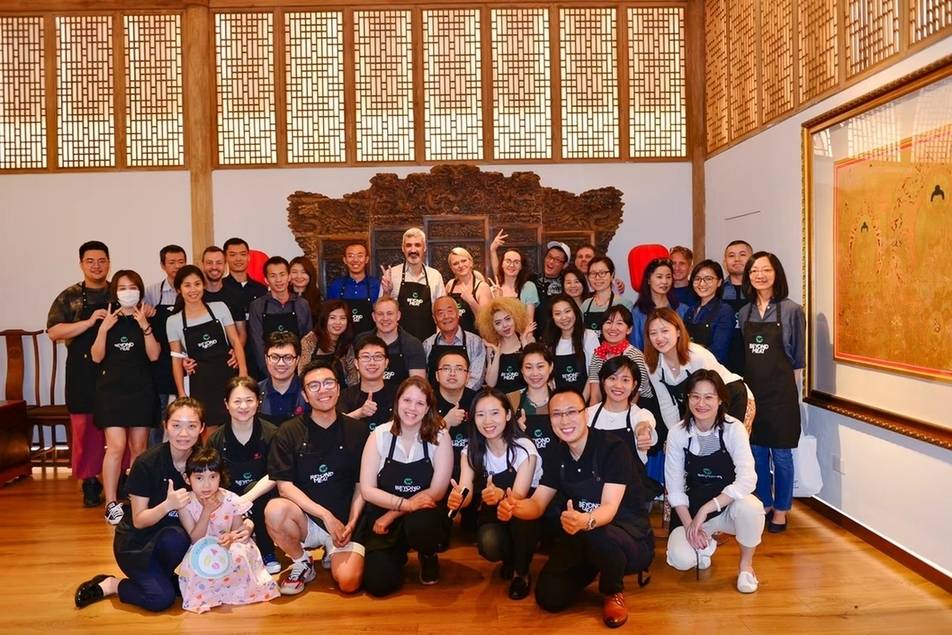Living|Open up to the Alternative: Living the Vegan Life in Beijing( 三 )

文章图片
【Living|Open up to the Alternative: Living the Vegan Life in Beijing】A vegan pizza dinner hosted by Vegans of Beijing at a Beijing restaurant (Junye Zhang/Guangming Picture)
As an organization mostly active on WeChat, Vegans of Beijing has different groups for its English and Chinese members, as well as a range of other groups for vegan markets, hangouts, recipes, and so forth. Altogether, there are around 2,000 members and over 40 volunteers. Most of the members are international expats, with an 80:20 foreign to domestic member ratio.
With a dynamic online community and a regular rollout of events, Vegans of Beijing seems right on track to achieving its goals. However, the members also face foreseeable challenges, not only in the promotion of veganism, but also in their daily lives.
One obvious challenge is the lack of vegan options in local Chinese restaurants. “When I ask for vegan options at certain restaurants, they would give me confused looks or simply tell me that’s not available,” said Jennifer. “I tried to get vegan catering at my wedding in Sanya, but most restaurants I contacted said they couldn’t do it.” Similarly, this might lead to accidentally eating food that contains non-vegan ingredients. “While I don’t consume animal products intentionally, sometimes I still get things like animal fat when I eat out, as it is a hidden ingredient in many dishes here,” said Max.
This is not limited to the availability of food options but is rooted in a lack of awareness of the concept of the vegan lifestyle. “Some of my students did a project on environmental protection, yet none of them mentioned veganism as a way to solve the current environmental issues,” said Jennifer. As people seem oblivious to the environmental philosophy behind veganism, Max feels pessimistic towards the possibility of veganism growing into a mainstream lifestyle in China: “Whenever Chinese people hear about vegetarianism or veganism, they assume it’s about Buddhism.” In addition, Max believes meat consumption is still highly regarded in China, being perceived as a healthier lifestyle and a symbol of wealth.
However, while the challenge ahead appears difficult, the group is determined in their efforts to close the gap of knowledge in China. “We still live in this carnism world, where people think eating meat is natural, normal, and necessary. People still live in this mentality, and they cannot live without it, but it’s part of an oppressive system. All kinds of social movements have to encounter this kind of oppressive mentality,” said Max, who defined the shift to a plant-based lifestyle as a social movement.
Living the vegan lifestyle has made Jennifer and Max more educated on animal and environmental protection. Now, they are acting out on this social responsibility in the hopes of influencing more people and making a positive impact on the world. In the process, they formed great friendships and found their own community in Beijing. Feeling a close bond with the members of Vegans of Beijing, Max defined the organization as “a cool group” that is very acceptive: “One reason I enjoy VoB is because it is a very diverse group. You don’t have to be anybody, you just have to be vegan.” He added that: “We are not the normal according to the mainstream standard, but we have our own group of people and community, and we are nice people.”

文章图片
Group photo of Max (first row fourth from the left) and other Vegan of Beijing members at an event (Photo provided to gmw.cn)
Though China’s vegan population remains small, in recent years, the country is seeing a surge of interest in a more plant-based diet. International branches like KFC, Burger King, and Starbucks have all introduced alternative meat products, while domestic companies like OmniPork, Z-Rou, and Zhenmeat have also developed meat-free substitutes.(2) In 2018, China’s plant-based meat market was estimated at 6.1 billion yuan ($910 million), which marked a 14.2% year-on-year increase and is expected to grow between 20 to 25 percent annually.(3) The visible demand for this alternative lifestyle shows that although meat consumption still dominates China, a foreseeable vegan revolution is also on its way.
以上关于本文的内容,仅作参考!温馨提示:如遇专业性较强的问题(如:疾病、健康、理财等),还请咨询专业人士给予相关指导!
「辽宁龙网」www.liaoninglong.com小编还为您精选了以下内容,希望对您有所帮助:- WinTam与虎同行 In Me The TIGER
- 黑色 与虎同行 In Me The TIGER
- 经典游戏《MOTHER》联名款G-SHOCK发售 复古精致
- 复古 ins时尚博主butwhythehell 低饱和度颜色打造美式复古
- ins时尚博主butwhythehell 低饱和度颜色打造美式复古
- 饱和度 ins时尚博主butwhythehell 低饱和度颜色打造美式复古
- 简实 臻启自在灵感 探索都市新潮 Theory思睿于昆明、郑州二地开设全新精品店
- thereME!
- 出货XM STUDIOS DC反派 罗伯LOBO 爆狼THE WOLF 1/4雕像
- The KAWS x The North Face "XX KAWS" Collection发布
